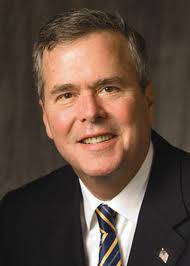From the Orlando Sentinel School Zone blog this morning:
Tony Bennett, Indiana’s outgoing state schools superintendent, has applied to be Florida’s next education commissioner, a spokesman for the Indiana Department of Education said this morning.
“After careful consideration, I have decided to submit an application for Florida’s Commissioner of Education position,” Bennett said in a statement. “The Sunshine State’s consistent commitment to providing all students a top-notch education is impressive and inspiring. I look forward to participating in the next stages of this process.”
Bennett championed what many call Florida-style education reforms in Indiana but lost his bid for Indiana’s elected school post in November. He lost to a teacher and teacher union leader who opposed many of those policies, including revamping teacher evaluations and allowing private firms to operate struggling schools.
Bennett is part of Chiefs for Change, a group of state education leaders whose work is promoted by former Florida Gov. Jeb Bush’s education foundations. Bennett spoke at Bush’s annual education summit last week in Washington, D.C.
The State Board of Education hires Florida’s education commissioner. The board is to interview finalists on Dec. 11 and could pick its commissioner at its meeting the next day.
More from Indianapolis Star, Education Week, Gradebook, StateImpact Florida.
Gradebook has a list of all applicants here.
Standardized test costs. They total about $1.7 billion a year nationwide, according to a new report from Brookings that includes state-by-state figures. Not much, concludes researcher Matt Chingos, who adds “perhaps we’re spending less than we should.” Coverage from Education Week and Huffington Post. Former Florida education commissioner Gerard Robinson tells the latter about test anxiety: “I won't pretend that tests don't matter and there's no anxiety -- but I also tell people there's anxiety with sex. There's anxiety with sex, but there isn't any talk about getting rid of that.”
And still more Jeb summit coverage. Politic365 on the “Florida Formula.” EdFly Blog on the crucial center. Rick Hess on "The Common Core Kool-Aid."
More protests from Hillsborough parents. They want better training for employees who work with special-needs children, StateImpact Florida reports. More from Tampa Bay Times.
More Jeb Bush summit. Checker Finn’s a fan. EdWeek writes up Arne Duncan’s speech. More from Bloomberg, Stateline, the Getting Smart blog.
New ed leadership. John Legg, the former state rep and new state senator from Pasco is the new chair of the Senate K-20 Education Policy Committee, reports Gradebook. (The post also includes a listing of all committee members.)
Weeding out low-performing charters. EdWeek. StateImpact Florida.
Per-pupil spending by state. A new federal report shows Florida at No. 42, at $8,863 per student in the 2009-10 school year, reports the Orlando Sentinel School Zone blog.
More on $10,000 degrees. The Daytona Beach News-Journal editorial board likes Gov. Rick Scott's idea. The Sentinel's Beth Kassab does not. More from the Lakeland Ledger.
More on low grad rates. Palm Beach Post.
Voucher accountability. A problem private school in Manatee County should prompt more oversight from the state, editorializes the Bradenton Herald.
 The next few years are critical for education reform, with the implementation of higher standards likely to put tremendous pressure on political leaders to abandon course, U.S. Education Secretary Arne Duncan said Wednesday.
The next few years are critical for education reform, with the implementation of higher standards likely to put tremendous pressure on political leaders to abandon course, U.S. Education Secretary Arne Duncan said Wednesday.
“The idea of implementing higher standards, the adoption in 46 states of higher standards, is clearly a huge step in the right direction. (But) that’s the easy part,” Duncan, referring to Common Core standards, said at a national education summit organized by Jeb Bush’s Foundation for Excellence in Education. “Will our political leaders have the courage when test scores drop 20, 30, 40, 50 percent? … Will they have the courage not to backpedal and dummy down standards like political leaders did under No Child Left Behind?”
Despite the challenges, Duncan said he was optimistic that state and local leaders would rise to meet them, and in bipartisan fashion. He pointed to recent reforms as proof.
“I’m actually extraordinarily hopeful,” he said in response to a question from moderator Andy Rotherham. “When I look at what states did, local legislative leaders, chief state officers, what they have done over the past couple of years, no one predicted that would happen. No one predicted that 46 states would adopt higher standards. No one predicted that three dozen states have taken teacher evaluations and principal support to a very different level. No one predicted that we would have 44 states working on the next generation of assessments. Frankly, we’ve had almost no rollback. And honestly, if a couple states choose to roll back, that would not be the end of the world.”
Duncan was a keynote speaker at the fifth annual summit, which drew about 800 participants from nearly every state. He made a pitch for continued investment in early childhood education and stressed teacher quality and teacher equity. He said the fact that not a single district has methodically moved to align its best teachers with its most struggling students is a sign of how far reformers have yet to go. (more…)
 Jeb Bush may or may not seek the presidency in 2016, but those who dismiss his education foundation as a political prop are simply out of touch. What the Foundation for Excellence in Education is showing once again, with its fifth annual national summit, is that it is creating a sense of urgency and national purpose around our most fundamental commitment to each new generation.
Jeb Bush may or may not seek the presidency in 2016, but those who dismiss his education foundation as a political prop are simply out of touch. What the Foundation for Excellence in Education is showing once again, with its fifth annual national summit, is that it is creating a sense of urgency and national purpose around our most fundamental commitment to each new generation.
Jeb summit coverage. Education Week: Jeb Bush urges reformers to stay the course. More from ABC News/Univision, Washington Times, National Journal, Herald-Tribune. Bush’s remarks on C-SPAN here. For the most complete summit coverage, check back at redefinED and/or follow us @redefinedonline.
Teacher evaluations. Under the new system, the vast majority of teachers in the Duval and St. Johns school districts are rated effective or highly effective (just like under the old system), reports the Florida Times-Union.
Florida Race to the Top finalists. Five districts in the mix, reports Gradebook.
More on Florida grad rates. StateImpact Florida. Orlando Sentinel School Zone blog.
 Recent election outcomes offer a snapshot of what people really think about education reform, said John Podesta, chairman and founder of the Center for American Progress. And lawmakers, advocates and opponents of school reform should all take note.
Recent election outcomes offer a snapshot of what people really think about education reform, said John Podesta, chairman and founder of the Center for American Progress. And lawmakers, advocates and opponents of school reform should all take note.
This month’s stunner - the ousting of Indiana public schools chief Tony Bennett, who implemented many of the same reforms found in Florida – is proof enough that reform “is not yet on solid ground,’’ said Podesta, the keynote speaker Tuesday during the fifth annual Excellence in Action National Summit in Washington, D.C.
At the same time, he noted, there are plenty of signs of progress, including historic passage of a ballot initiative in Washington that paves the way for charter schools.
The common ground seems to be a desire to create a system that works for children, he said, and reformers should seize the moment.
“As the lines blur, the movement has to invest in collaboration … ,’’ said Podesta, a former White House chief of staff to President Bill Clinton and longtime policy adviser.
“I think complete division between unions and reform is not helpful,’’ he said. “We have to let this go.’’
He also said reformers can’t “steamroll’’ measures without educating the public. “Stop just focusing on your enemy and start shoring up your allies,’’ he said. (more…)
 Kicking off his foundation's fifth annual national education summit, former Florida Gov. Jeb Bush stressed the usual components of his reform agenda today but also accented an increasingly big talking point: bipartisanship.
Kicking off his foundation's fifth annual national education summit, former Florida Gov. Jeb Bush stressed the usual components of his reform agenda today but also accented an increasingly big talking point: bipartisanship.
Bush said “new coalitions on the left and right” are moving to revamp teacher evaluation and compensation systems and concluded his 30-minute remarks with a lengthy homage to the leadership skills of former Democratic President Lyndon Johnson. He also noted the bipartisan backing of so-called “parent trigger” legislation, which he predicted would pass the Florida Legislature next year after failing on a dramatic 20-20 tie in the Senate last spring.
“This is one of those great places where the center, left, right coalitions of this world need to work together. And that’s exactly what’s happened,” Bush said, singling out Parent Revolution, the left-wing group that has led the charge nationally for the trigger.
Referring to his own Foundation for Excellence in Education, which organized this week’s conference, Bush continued, “We’re supposed to be center-right, I guess,” but “we will work with everybody to be able to empower parents who right now feel hopeless about whether or not they have any say about their children’s future.”
The summit has grown in both stature and bipartisanship, and this year's event includes nearly 800 attendees from 46 states. John Podesta, former chief of staff to President Clinton, is today's keynote speaker. Arne Duncan, President Obama's education secretary, will address the group tomorrow.
Bush framed his remarks about education reform and expanded school choice with concerns about declining social mobility. (more…)
Florida mirage? As the Foundation for Excellence in Education summit gets underway today, Reuters takes a look at Florida’s academic progress in the Jeb Bush era and writes “a close examination raises questions about the depth and durability of the gains.”
Grad rates. Florida’s aren’t good, according to a new U.S. DOE report, reports Gradebook.
 $10,000 bachelor’s degrees. Gov. Rick Scott challenges state colleges to come up with innovative ways to bring down costs, reports the Tampa Bay Times. The Times editorial board calls it a “publicity stunt.” Board of Education member Roberto Martinez is also not impressed. More from the Orlando Sentinel, Palm Beach Post, Florida Times-Union, Miami Herald, Tampa Tribune.
$10,000 bachelor’s degrees. Gov. Rick Scott challenges state colleges to come up with innovative ways to bring down costs, reports the Tampa Bay Times. The Times editorial board calls it a “publicity stunt.” Board of Education member Roberto Martinez is also not impressed. More from the Orlando Sentinel, Palm Beach Post, Florida Times-Union, Miami Herald, Tampa Tribune.
Proposed school closings in Brevard and the connection to new charter schools. Florida Today columnist Matt Reed.
The lineup for this week’s Jeb Bush education conference is further evidence that a growing centrist coalition has emerged to move the ball on education reform and school choice.
This is the Foundation for Excellence in Education’s fifth national summit, and it grows in both stature and bipartisanship every year. Two years ago, it made headlines when President Obama’s education secretary, Arne Duncan, was announced as a keynote speaker. This year, Duncan’s speaking again. So is John Podesta, the former Clinton chief of staff who heads the left-leaning Center for American Progress; and Gloria Romero, the former Democratic California state senator who authored the original parent trigger bill; and, on various panels, other Democrats like North Carolina Gov. Bev Perdue and Virginia State Delegate Algie Howell.
So, on the one hand, it’s no longer so notable that more and more liberals and progressives and Democrats are part of this constellation. On the other hand, holy smokes! Clearly, they’re not on the same page with Jeb Bush and fellow conservatives on every education issue. But the strength of the arguments in favor of ed reform and school choice, and the leadership of folks like Bush and Obama, have galvanized people from all across the political spectrum to have respectful, thoughtful discussions about our schools and our kids in ways that just weren’t possible 10 or 15 years ago.
I don’t know how long this will last, but the 2012 elections have at least produced a renewed call in Congress for a bipartisan solution to the deficit crisis. I suspect this is a rare opportunity in education, and reformers of all stripes would be wise to recognize it as such, and to do what they can to extend it. One way to foster that political cooperation is to make the public better aware that all this is happening – that Republicans and Democrats have actually found common ground on more than a few planks of ed policy. (more…)